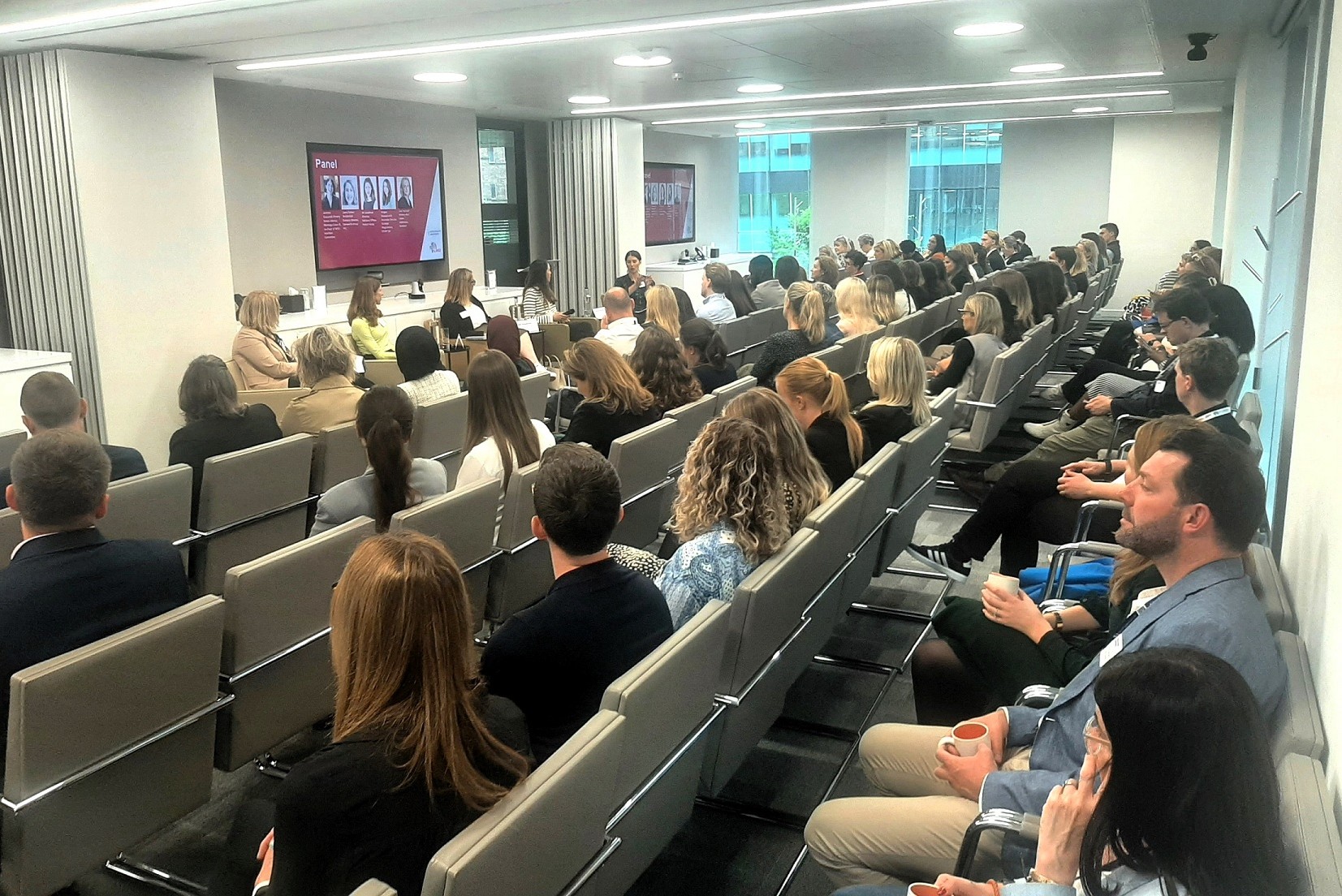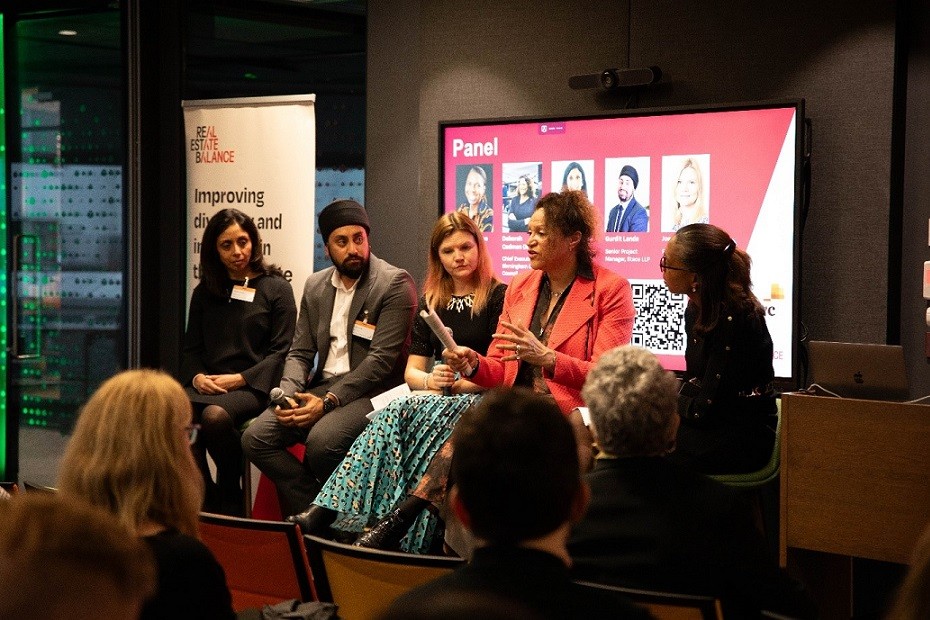By joining Real Estate Balance’s email list, you agree to receive email updates from time to time about organisation news, events being held and information about our partners in accordance with the terms outlined in our privacy notice, which you can read in full here.
Sign upReal Estate Balance in Edinburgh

As part of the programme of activities to bring Real Estate Balance to our members across the United Kingdom, we were delighted to recently take part in an important discussion on sleep, lifestyle and employee health and work/life balance kindly hosted by Shepherd and Wedderburn in Edinburgh.
The event saw wellness experts and real estate and associated sector professionals from our member organisations discuss employee wellbeing alongside wider equity, diversity and inclusion (EDI) issues relevant to the city and its property industry.
The panel comprised:
- Helen Puttick (Chair) - Health Reporter, The Times (Scottish edition)
- Ally Campbell - Partner Specialising in Planning, Montagu Evans
- Gill Grassie - Nutritional Therapist, GiCa Nutrition
- Morag Hutchison - Partner in Employment Law Practice, Shepherd and Wedderburn
- Murray Strang - Managing Partner for Scotland, Cushman & Wakefield
They started off by sharing their thoughts on how the ethos of wellbeing, across areas including stress and anxiety, navigating demanding personal and professional lives and productivity, can be impacted by a person’s sleep, diet, exercise and overall health, and how this had risen up the agenda in many organisations during and after the pandemic.
Morag said that in her conversations with employers and employees, she had noticed a definitive shift in recent years when it comes to people being more open to discussing issues around their physical and mental health with their managers and employers, noting that it was in an organisation’s best interest to explore with staff how they can be their best selves at work.
She also pointed out that an employee who was sleep deprived because of family commitments, the menopause or stress and or anxiety could in certain circumstances, should they relate to a disability diagnosis, request for their employer to make reasonable adjustments to allow them to perform their role.
Helen suggested another change in recent years was the reduced prevalence of alcohol at work-related events. Gill welcomed this development because of the negative effect drinking can have on deep sleep and feeling energised and revitalised. Murray highlighted that his organisation, like others, provides staff with healthy and nutritious food and drink, which was not the case until recent years.
He also added that being the first to get to work and last to leave was no longer viewed “as a badge of honour” and that instead it would raise questions about whether a person was working to a suitable level of efficiency. He suggested that it was incumbent upon organisations and managers to provide the environment and means for employees to have healthy work/life balances, and then to monitor the processes to make sure were working for everyone.
Ally highlighted that from a planning perspective, more requirements were being introduced at the Scottish Government level for developers to consider the likes of 20-minute neighbourhoods, active travel and biodiversity to encourage people to be more active and for spaces to be more inclusive. There is also a market pressure for developers to create working environments that provide, for example, gyms, changing facilities, bike storage and cafés with healthy food in workplaces because people are increasingly demanding them from their employers.
On the topic of homeworking and hybrid working, Gill said that while the research was not yet conclusive, a poorer diet through easy access to takeaways and food deliveries, potentially less exercise without the commute to work and reduced social interaction were all possible ways for health and wellbeing to be undermined. On the other hand, though, the opportunity to take proper breaks, go for a quick walk and fit in activities away from screens, which tend to be easier to do while working at home, had the potential to improve employee health and wellbeing.
Murray said that while there was a clear case for the collaboration and relationship-building that comes with physically being in the workplace, the flexibility of working from home one or two days a week can also be beneficial for productivity. Morag said that she personally felt more energised when working in the office, and that she was concerned that if it was broadly true that women prefer working from home more than men, as studies suggest, then there could be medium and long-term effects on career progression opportunities for women because of reduced visibility.
The panel shared their thoughts on a question from the audience about developments in France which could see a ban on workers communicating outside of certain hours. While nobody expected similar developments in the UK any time soon, the discussion points included the spectrum of expectations for leaders broadening because of developments including hybrid working and the EDI agenda, striking a balance between accommodating the wishes of individuals and having overall responsibility for teams, and how people needing to rest and recharge over the weekend was now far more respected than it was previously was, in the context of the UK at least.
One panellist also highlighted how the HR Directors they speak with say that Generation Z and Millennials are firmer in setting boundaries when it comes to availability outside of standard office hours and also prioritising their mental health and wellbeing than previous generations, which while positive, is also a change that businesses are having to adapt to.
Another attendee asked for the panellists’ thoughts on the introduction of a four-day week and Helen pointed out that she has noticed considerably less footfall and people around on Fridays already. A four-day week could also have the potential to actually lead to overall more employee stress and anxiety and sleep problems, albeit in fewer days, another panellist suggested.
Murray highlighted research that has found that office occupation and attendance is higher in Edinburgh than Glasgow due to more public sector organisations and their slower return to in-person working in the latter, and also because Glasgow is a bigger, wider-spread city which has lead to fewer people commuting back to the city centre.
The final question of the evening was about a finding in the presentation delivered by GiCa Nutrition before the panel session relating to the prevalence of sleep deprivation seen across the UK, and how employers can encourage staff to switch-off outside of the workplace. Gill said that it ultimately comes down to an individual’s self-control and imposing a bedtime routine without screens.
Gill delivered the presentation on topics including sleep science and chronobiology and the impact of diet, exercise and stress on sleep quality and quantity prior to the discussion alongside Nutritional Therapist Dr Caterina Fiegna. If you would like to find out more about the services they offer to businesses, please click here.
A huge thank you to the supporters of Real Estate Balance in Scotland and to Helen, Ally, Morag, Murray, Gill, Caterina, Shepherd and Wedderburn and everyone who attended this enlightening event. We look forward to seeing you again soon!


